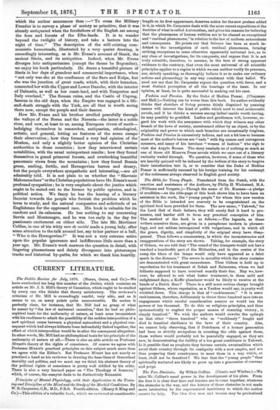CURRENT LITERATURE.
The Dublin Review for July, 1876. (Burns, Oates, and Co.)—We have overlooked too long this number of the Dublin, which contains an article on Mr. .7. S. Mill's theory of Causation, which ought to be studied by every one who thinks that theory satisfactory. The reviewer's criticism of Mr. Mill is exceedingly candid, very able, and as it seems to us, on many points quite unanswerable. He makes it perfectly clear, for instance, that Mr. Mill had no grasp of what he meant by "the law of universal causation," that he had no philo- sophical basis for the uniformity of nature, at least none inconsistent with his readiness to admit the possibility of the sudden interposition of a no* spiritual Cause between a physical antecedent and a physical con- sequent which had always hitherto been indissolubly linked together, the effect of which interposition would be to alter the consequent altogether. In other words, Mr. Mill had no philosophical basis for his principle of the uniformity of nature at all.—There is also an able article on Professor Mivart's theory of the rights of conscience. Of course we agree with Professor Mivart's practical principles on this subject much more than we agree with the Editor's. But Professor Mivart has not nearly so practised a hand as his reviewer in drawing the base-lines of theoretical morality and politics, and we must say we think his abstract theory of the political rights of conscience is pretty well riddled by his critic. There is also a very learned paper on "The Theology of Irenteus," which, of course, the essayist finds to be distinctively Romanist.






























 Previous page
Previous page